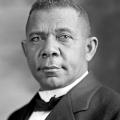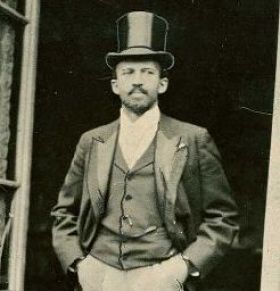66. Lifting the Veil: Introducing W.E.B. Du Bois
W.E.B. Du Bois emerges as a historian, sociologist, and innovative philosophical thinker in the 1890s, and introduces his famous idea of "double consciousness."
Themes:
• W.E.B. Du Bois, The Suppression of the African Slave-Trade to the United States of America, 1638-1870 (New York: 1896).
• W.E.B. Du Bois, "The Conservation of Races," The American Negro Academy Occasional Papers, No. 2 (Washington. D.C.: 1897).
• W.E.B. Du Bois, The Philadelphia Negro: A Social Study (Philadephia: 1899).
• W.E.B. Du Bois, "The Study of the Negro Problems," The Annals of the American Academy of Political and Social Science 11 (1898): 1-23.
• W.E.B. Du Bois, The Souls of Black Folk: Essays and Sketches (Chicago: 1903).
• W.E.B. Du Bois, The Autobiography of W.E.B. Du Bois: A Soliloquy on Viewing My Life from the Last Decade of Its First Century (New York: 1968).
• W.E.B. Du Bois, The Oxford W.E.B. Du Bois Reader, ed. Eric J. Sundquist (New York: 1996).
---
• A. Appiah, "The Uncompleted Argument: Du Bois and the Illusion of Race," Critical Inquiry 12 (1985): 21-37.
• B.W. Bell, E.R. Grosholz, and J.B. Stewart (eds), W.E.B. Du Bois on Race and Culture: Philosophy, Politics, and Poetics (New York: 1996).
• L.K. Bright, "Du Bois' Democratic Defence of the Value Free Ideal," Synthese 195 (2018): 2227-2245.
• A.J. Cooper, A Voice from the South (Xenia: 1892).
• R. Gooding-Williams, In the Shadow of Du Bois: Afro-Modern Political Thought in America (Cambridge, MA: 2009).
• D.L. Lewis, W.E.B. Du Bois: Biography of a Race, 1868-1919 (New York: 1993).







Comments
Thank you
I've been reading Du Bois for the past couple months and this episode and the entire Africana series has proven a terrific companion to it. I never would have heard of figures like Maria Stewart or Martin Delaney without this series - much less comprehended such a continuous tradition of thought and debate in the African diaspora. I'm tickled that we've finally reached Du Bois so I can start to think concretely about this tradition and these debates at play in his work. I'm hoping next episode and the future episodes on Du Bois may draw some attention to his place in these debates and this tradition. I suppose at least his 'rivalry' with Booker T Washington will get covered.
All this is to say: thank you, Peter and Chike, for this series and the knowledge. Whatever praise it's been given is nowhere near enough! And whatever gratitude I can express won't be enough either! I've already learned so much! Thank you, thank you, thank you!
In reply to Thank you by Matthew Church
Du Bois
Wow, thanks for the enthusiastic reaction! We will indeed look at the Du Bois vs Washington contrast, including how other figures positioned themselves with respect to that opposition.
Outline
With 3 weeks left, will you be posting the outline of your episode plan for Africana part 3 up on the blog soon? Just Curious
In reply to Outline by Otterlex
Outline
Oh yes, I actually meant to do that for the Reformation and next part of Africana for New Year. Thanks for reminding me, will do that soon!
Afrocentrism
Afrocentrism has become a current topic over the reaction to Netflix's Queen Cleopatra, which I think is a very informative docudrama. No, I don't think they portray Cleopatra as black, for two reasons:
!. The actress, Adele James has a fairly light brown skin tone. She is mixed race.
2. The scholarly experts explain Cleopatra VII's Macedonian ancestry very clearly, and also point out we do not know who her mother and grandmother were. So there is a good chance she has some Egyptian ancestry and is mixed race of a different sort (Egyptian, Persian, Macedonian).
However, apparently quite a few people do think Cleopatra VII was black.
I know little about the history of Afrocentrism, aend was intrigued that Dubois thought Egyptian civilization had African origins (Wikipedia).
In reply to Afrocentrism by Pat Daley
Egypt having African origins
I guess it depends what you mean exactly by African origins. I don't know what Du Bois meant, but it seems obvious to me. I mean, Egypt is in Africa, and unless there is Egyptian history I don't know about, came about on its own (Egypt is considered one of the "cradles of civilisation" after all). So a civilisation that was located and born in Africa, that sounds like to me it has "African origins" if that term is to mean anything.
Add new comment